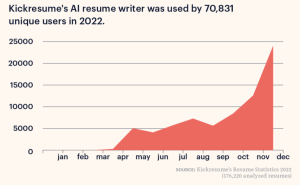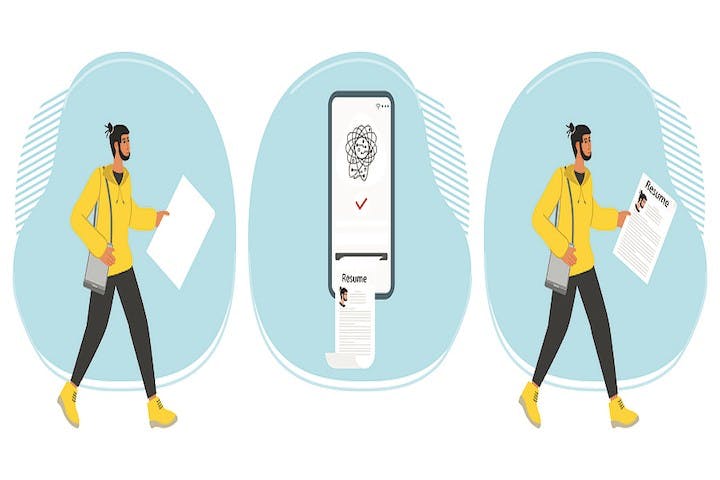If you’re an HR professional, you’ve clearly sorted through many mountains of resumes in your time – all to find that (sometimes elusive) best-possible applicant for a job opening.
But in the past year, you’ve also probably noticed one this – a growing number of resumes that appear to have all the telltale signs of being AI-generated.

Maybe they stand out for being longer than usual, or that they’re a bit repetitive, or the language used a bit too flowery and hyperbolic for your taste.
Quite possibly, the chances are you may have set aside those resumes and never given them a second thought.
But should you really be penalizing applicants for their AI-generated resumes?
AI-generated doesn’t mean untruthful
I think some HR professionals are concerned because they think applicants who use AI are more likely to inflate their experiences.
But if someone really wants to lie on their resume, do they really need AI to do it?
Anyone can lie about their professional experience, with or without the help of ChatGPT. So I have a hard time accepting that kind of skepticism.
Now, maybe the real problem is that, with some AI-generated resumes, there’s too much repetition and bombast, which is certainly common with AI-produced content.
But I believe that how well a prospective employee writes a resume isn’t necessarily the best demonstration of a potential applicant’s suitability.
Say you’re trying to fill a software engineering position and you get an application from a developer whose first language isn’t the one your team operates in – for illustration, let’s assume that’s English.
The chances are you’re hiring developers for their coding abilities, not their grasp of the English language or their ability to write a good professional summary.
Which leads me to my next point. Dismissing AI-generated resumes may leave you in the position of unfairly rejecting candidates from underrepresented populations; people whose English might not be perfect.
It’s worth remembering that generative AI can actually help some professionals, particularly those for whom English is a second language. It can help them more clearly explain, for example, their job history and value. It you reject these resumes outright, you may find that your hiring process becomes biased as you reject potentially good candidates solely based on what seems to be an AI-generated one.
What about jobs that require grasp of language
Another argument I hear about AI-produced resumes is that what if the job you’re trying to fill specifically requires certain skills, like writing emails or documentation – skill that rely more heavily on having a good grasp of the English language.
Well, even then I would argue this is still not a good reason to reject AI-generated resumes. If applicants can use AI to write a decent resume, they can probably use it to write a good email or proofread and edit their drafts.
See where I’m coming from?
In other words, should it really matter whether your prospective employee has an in-depth understanding of the rules of English grammar or instead just happens to be able to use AI to catch major grammatical errors? The end result, and the quality of that employee’s work, may be similar either way.
Mastering AI is a valuable skill
When you think about it, discovering someone has used AI to build their resume might actually be a good thing.
Using generative AI to apply for a job could highlight a candidates’ valuable capabilities.
In particular, if you’re hiring applicants for their tech skills, why would you have a problem with them showing those skills through a well-written resume with an AI assist?
Far from laziness or corner-cutting, strategic use of AI represents resourcefulness.
In fact, I think using AI often points to initiative and adaptability. It probably means that your applicant has made an effort to learn how to use AI properly and is willing to turn to technological tools to streamline daily tasks. And that means productivity.
A balanced approach is needed
Admittedly, simply using AI to create a resume doesn’t mean that person has mastered the technology.
Anyone who’s spent any time with generative AI knows that getting a polished product is rarely as simple as submitting one prompt.
It requires a bit of analysis – candidates need to get the model to understand what their goals are, plus even when they’ve constructed their resume it would still be foolhardy for them to submit anything AI churns out without a healthy dose of editing.
Where I do see lack of care or skill with AI is where resumes are extremely long, poorly formatted, or full of obvious exaggerations that don’t match the applicant’s skill level.
Or they contain a myriad of trendy buzzwords that don’t mean much of anything.
For example, when words like “innovative,” “transformative,” and “cutting edge” are liberally littered throughout the CV, it’s entirely possible that your prospective employee didn’t take a whole lot of time to edit it.
Final thoughts
Whether you are willing to accept AI-generated resumes or not should really come down to what you’re hiring applicants for.
If you are hiring applicants solely for their grasp of the English language, good grammar, and their ability to express themselves in writing without the help of technology, then maybe you’d have some reason to be concerned about a purely AI-generated resume.
But I can’t really think of an instance where selective use of AI wouldn’t be an advantage.
These days, even professional writers and editors are finding ways to wield generative AI to their advantage.
AI is becoming more and more common in every industry, so let applicants use the tools they know best, and better yet, use those skills for the benefit of your organization.
So rather than rejecting resumes that seem AI-dependent out of hand, use some discernment.
It’s true that AI should be a tool, not a crutch. Maybe use the resume as a chance to explore how applicants think about AI and how well they use it.
And while you’re at it, don’t forget to factor in their other qualifications and previous experience.
